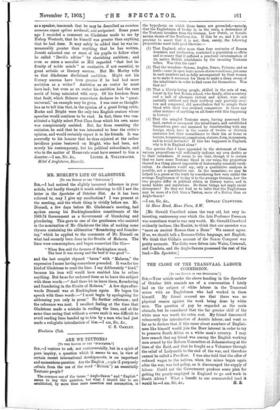ARE WE TEUTONS
[To THE EDITOR OF THE "STEcTATOE.1
venture to ask, not controversially, but in a spirit of pure inquiry, a question which it seems to me, in view of certain recent international developments, is an important and momentous question. Are the English people (I purposely refrain from the use of the word "British") an essentially Teutonic people ?
The common use of the terms "Anglo-Saxon" and " English " seems to beg this question, but what I should like to see established, by more than mere assertion and assumption, is the hypothesis on which these terms are grounded,—namely, that the Englishman of to-day is, in the main, a descendant of the Teutonic invaders from the German, Low Dutch, or Scandi- navian shores of the Northern Sea. If this be so, and I do not presume to assert that it is not, then, surely, the following propositions must hold good likewise :—
(1) That England, after more than four centuries of Boman dominion and civilisation, contained a population so effete and so scanty that it suffered a practical extermination of its native British inhabitants by the invading Teutonio tribes. Was that the case?
(2) That the invaders—Saxons, Angles, Danes, Frisians, and so forth--came in open boats across storm-vexed seas, yet came in such numbers and so fully accompanied by their women as to make it necessary for them to make a clean sweep of the inhabitants in order to find room for themselves. Was that so ?
That a liberty-loving people, skilled in the arts of war, learnt in the best Roman school, who finally, after a century and a half of alternate victory and defeat, were only partially subdued and their territory only partially over- run and conquered, did nevertheless fail to mingle their blood with their less civilised conquerors. Is there any other instance of anything on all fours with this happening in history ?
(4) That the mingled Teutonic races, having possessed the land, ousted or massacred the inhabitants, and established themselves, pure and unmixed by interbreeding with any foreign stock, have in the course of twelve or thirteen centuries lost their resemblance to their kin at home in feature, temperament, complexion, stature, form, in manners, and in social instincts? If this has happened in England, why is it in England alone?
The queries that I have appended to the statement of these various propositions will sufficiently indicate my own doubts as to their soundness. It seems to me that, though it is certain that we have some Teutonic blood in our veins, the proportion thereof is a thing almost impossible of historically scientific verifi- cation. As chemists would say, only a qualitative analysis is possible, not a quantitative one. In the meantime, we may be helped to a guess at the truth by considering how very unlike the average Englishman of to-day is to the average German, how the two peoples differ in political ethics, in literary tastes, and in social habits and aspirations. Do these things not imply racial divergence? Do they not lead us to infer that the Englishman may be more of a Celt than a Teuton, more of a Briton than an Anglo-Saxon ?
—I am, Sir, Ste., OSWALD ORA.WFURD,
34 Hans Road, Hans Place, S.W.
[Mr. Oswald Crawfurd raises the very old, but very in- teresting, controversy over which the late Professor Freeman was sometimes wont to wax very wroth. Mr. Oswald Crawfurd evidently inclines, like Hamlet, to think that our ancestor was "more an ancient Roman than a Dane." We cannot agree. If so, we should talk a Romano-Celtic language, not English. We think that Gildas's account of the Saxon Conquest was pretty accurate. The Celts were driven into Wales, Cornwall, and Cumbria, and the Anglo-Saxons possessed the rest of the land.—En. Spectator.]






























































 Previous page
Previous page